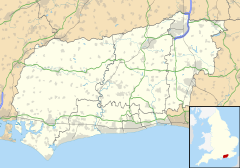Birdham, West Sussex
| Birdham | |
|---|---|
 Birdham Upper Pool |
|
| Birdham shown within West Sussex | |
| Area | 6.96 km2 (2.69 sq mi) |
| Population | 1,483. 2011 Census |
| • Density | 202/km2 (520/sq mi) |
| OS grid reference | SU824003 |
| • London | 58 miles (93 km) NNE |
| Civil parish |
|
| District | |
| Shire county | |
| Region | |
| Country | England |
| Sovereign state | United Kingdom |
| Post town | CHICHESTER |
| Postcode district | PO20 7 |
| Dialling code | 01243 |
| Police | Sussex |
| Fire | West Sussex |
| Ambulance | South East Coast |
| EU Parliament | South East England |
| UK Parliament | |
| Website | http://www.birdham.org.uk/ |
Birdham is a village and civil parish in the Chichester District of West Sussex, England. It is located on the Manhood Peninsula, about five miles (8 km) south west of the city of Chichester. The parish church is dedicated to St James although the dedication was to St. Leonard until c 1900.
The nearest railway station is some three miles (5 km) northeast of the village, at Chichester or Fishbourne.
The village sits on the shores of Chichester Harbour and is home to a locked marina on the site of a former tide mill pond. The tide mill building itself still exists. In between it and Chichester marina are the lockgates to the disused Chichester Canal opened in 1822. The local school is Birdham C of E Primary School. According to the 2001 census it had a population of 1,408.
HMS Birdham, a minesweeper, launched on 19 September 1955, was named after the village.
Birdham parish church of St James
Stirlands Cricket Club
The only evidence of prehistoric settlement is a Bronze Age settlement.
Birdham is first mentioned in a series of Anglo-Saxon charters relating to land grants to the See of Selsey. Unfortunately, most of these are forgeries, It is an area of dispersed settlements with no defined centre with a single store and no pubs. The enclosure of Manhood Common led to the development of small farms but the rapid rise in population only began in the 1930s.
During WW2, the tide mill and associated boat yards became HMS Sea Serpent in 1942. The various holiday camps in the area were used as billets for troops training for amphibious landings, especially D Day.
...
Wikipedia

